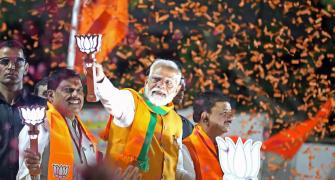Amid the noise around multinational retail chains queuing up to enter India comes a calming revelation. According to management consultancy firm A T Kearney, not all retail biggies continue in the new markets that they enter.
In fact, a disconcerting two out of three have not succeeded out of their home markets and 70 per cent have withdrawn from Asia.
Among the recent instances, Carrefour of France sold its stores in South Korea to E-Land in 2006 and, in the same year, Wal-Mart quit South Korea.
The biggest retailers in the world -- such as Wal-Mart, Tesco and Carrefour -- are keen to tap the opportunity in India, where the retail sector is expected to grow from $350 billion to $427 billion by 2010 and $365 billion by 2015.
However, as talk of setting up shop in India turns to action, retailers face their share of challenges, not the least of which is the government's decision to allow foreign direct investment only in single-brand retail and only up to 51 per cent.
Already, Nanz, which had set up the country's first supermarket chain in a joint venture with Escorts, has shut shop here. Others have been complaining of tricky regulation, including cumbersome and "obsolete" customs procedures.
"Asia has more challenges for retailers than Europe and the Americas due to supply chain issues, infrastructure bottlenecks, complex customer behaviour and so on. Retailers can see some commonality in Australia, Germany and the US, but in Asia, the environment is very unique," said Hemant Kalbag, principal, A T Kearny.
One of the aspects unique to India is the large number -- 12 million -- of neighbourhood kirana stores.
"On an average day, you can see 45-50 trucks plying on the roads in Europe and US to cater to retailers. But places like Mumbai can't accommodate such traffic. A hypermarket like Hypercity gets four truckloads of supplies in the UK and US. But in India, it is very difficult due to the lack of cold chains, poor infrastructure and inconsistencies in supplies. Laws such as Packaged Goods Act and Weights and Measures Act are a big challenge for retailers," said Hypercity CEO Andrew Livermore.
Agrees KSA Technopak chairman Arvind Singhal: "Retailing is selling whatever is needed and cultivating local competence. Very few international companies have these. Barring eight to 10 names like Wal-Mart, Carrefour and Tesco, there are very few retailers that can call themselves truly global."
However, Rajnan Biswas, partner, Ernst & Young, says that one must look at the entry or exit of a retailer in the light of its global strategy. "Even if Wal-Mart and Carrefour exited Korea, they might have a relook after two-three years if the market is worthwhile."
According to Kalbag, India is in a peaking stage. "After 12-18 months, the window of opportunity will enter the declining stage," he said.
Livermore however pointed out that the higher price-to-earnings ratios of Indian retail companies, compared with that of their western counterparts, showed the enormous investor interest in India's retail story.
While Pantaloon has a PE ratio of 58.8, Shoppers' Stop's is 85.9 and Trent's 41.8. Wall-Mart, on the other hand, has a PE ratio of 16, Carrefour 19, Metro 22 and Sainsbury the highest at 31.
"It indicates a large amount of liquidity and that investors are excited about India's retail revolution. Earlier, the PE ratios were not very high in markets where organised retailing made its debut. India is the first market where PE ratios are vey high," Livermore said.








